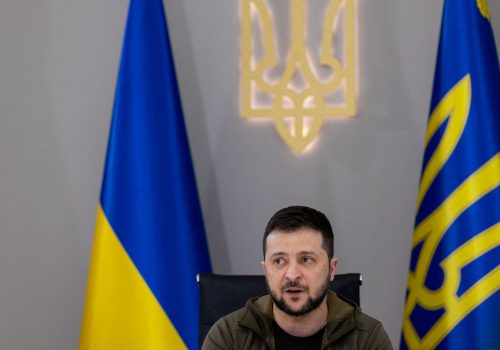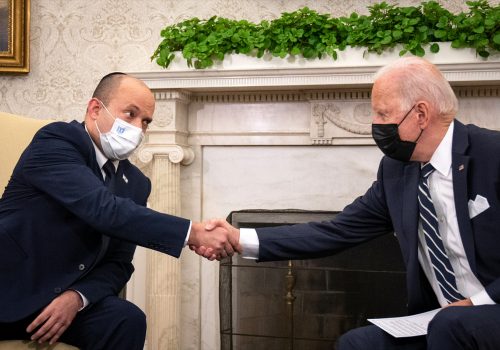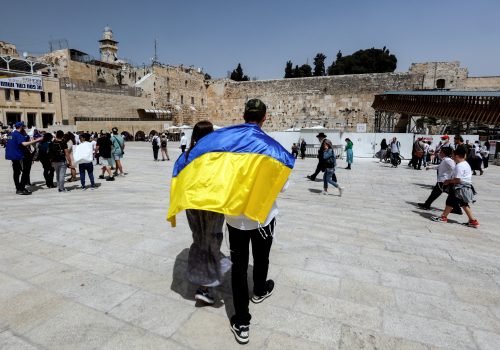Israel’s PM gave a Holocaust Remembrance speech without mentioning Iran. It signals a new approach.
In his speech on April 27, at the opening ceremony of Israel’s Holocaust Martyrs’ and Heroes’ Remembrance Day in Jerusalem, Prime Minister Naftali Bennett departed from his predecessor’s approach in one very significant way: he made no mention of Iran.
This address, broadcast live with government officials, leading figures in Israeli society, and Holocaust survivors and their families present, is one of the most prominent speeches an Israeli prime minister delivers annually.
For each of the past thirteen years—five of which I attended as US ambassador to Israel—former Prime Minister Benjamin Netanyahu was the speaker. Together, with tributes to Jews murdered by the Nazis and their collaborators and emotional words honoring the survivors, he nearly always took the opportunity to speak bluntly about the threat of Iran and its pursuit of nuclear weapons. Not infrequently, Netanyahu described the threat in terms that evoked the prospect of a second Holocaust—an outcome he swore that Israel would act to prevent even if the world turned away.
Bennett took a different approach. His focus was on the lessons for Israel and the Jewish people on the Holocaust’s unique evil: the persistence of antisemitism through the ages; the Jewish people’s essential and unbreakable link to its historic homeland; Israel’s obligation to be strong and self-reliant; and the imperative for unity to triumph over divisions in Israel. This last theme reflects Bennett’s current priority, as he was targeted by a death threat earlier this week, which was mailed to his home with a bullet in an envelope, and his broad but bare governing coalition wobbles without a majority.
Partly, the difference reflects a generational shift. The Holocaust is hardly ancient history to Israelis, particularly for the many whose families were gutted and shaped by it. Indeed, for Foreign Minister Yair Lapid and Defense Minister Benny Gantz, each the child of a survivor, it is only one generation removed.
However, Bennett is more than two decades younger than Netanyahu. Not old enough to remember Israel’s wars of survival in 1967 and 1973, Israel has projected strength for all his adult life. He is deeply aware of the threats Israel still faces, to be sure, and has advocated policies at times more hawkish than Netanyahu’s, such as on Israeli settlements in the West Bank. But, as prime minister, he hasn’t been one to portray Israel as being in existential danger—the common image of its early decades.
Bennett’s choices in his speech also suggest a subtle difference from Netanyahu on Iran. There is no denying that Bennett sees Iran as a mortal enemy, led by a regime that calls for Israel’s destruction, arms terrorist proxies, and seeks nuclear weapons. And he did raise the Iranian threat in his speech to foreign diplomats on International Holocaust Remembrance Day in January 2022. But, when it comes to domestic discourse, it appears Bennett believes it benefits neither Israel’s security nor the morale of its citizens to portray Iran as a new Nazi regime coming to impose a second Holocaust; or, at least, to make that the central argument by linking Iran’s threats to a solemn day of remembrance of the six million.
That difference is also relevant to Israel’s approach to the fate of efforts to negotiate a revival of the Iran nuclear deal, which the Donald Trump administration withdrew from in 2018. Those talks, currently at an impasse, as Iran and the United States seem unable to resolve a dispute regarding the inclusion of the Islamic Revolutionary Guard Corps (IRGC) on the US Foreign Terrorist Organizations list, could yet yield a breakthrough and a renewed deal or collapse once and for all.
Bennett, like Netanyahu, has made clear he opposes the deal. Other voices, notably Gantz, take a more nuanced approach, but the fundamental Israeli policy hasn’t changed.
What has changed is Bennett’s decision to focus less on arguing with the United States in public and more on upgrading Israel’s capability to defend itself, including its ability to strike inside Iran. This approach will be relevant to either outcome the talks produce: a deal that delays Iran’s nuclear program but provides sanctions relief that Tehran will use to fuel its regional aggression, or no deal, leaving Iran as a nuclear threshold state while sanctions remain in place. In either case, Bennett signals confidence that Israel will be vigilant and strong.
That confidence grows out of more than just a different philosophical approach. It is also linked to the dramatic changes underway in the region. While Bennett focused his speech on internal lessons, his only reference to Israel’s regional situation was upbeat: “We are building bridges to new and old friends and deepening our alliances.”
What was once unthinkable is becoming routine. Israeli leaders visit their Arab counterparts regularly: Bennett to the United Arab Emirates; Lapid and Gantz to Bahrain and Morocco. On March 27, four Arab foreign ministers attended the historic Negev Summit in the most symbolic display of the new regional alignments. The strong expectation is that the normalization trend launched by the Abraham Accords won’t stop with the countries that have currently signed on. Other players in and beyond the region are weighing how they will benefit from an open relationship with Israel.
For Bennett, these positive developments don’t remove the threats Israel faces nor relieve it of the obligation to be strong, defend itself, and rely on no one else. But they do signify a hopeful new reality, an ending of Israel’s isolation, and the coalescing of a new regional coalition able to unite to face common threats and build new opportunities. That, indeed, is a different backdrop for Israelis as they observe Holocaust Remembrance Day.
Daniel Shapiro is a distinguished fellow at the Atlantic Council and a former US ambassador to Israel.
Further reading
Wed, Apr 6, 2022
Zelenskyy wants Ukraine to be ‘a big Israel.’ Here’s a road map.
New Atlanticist By Daniel B. Shapiro
By adapting their mindset to mirror aspects of Israel’s approach to security challenges, Ukrainian officials can tackle their own critical challenges with confidence.
Tue, Aug 31, 2021
Biden and Bennett turned the page on US-Israel ties. But not many were paying attention.
MENASource By Jonathan H. Ferziger
Israeli Prime Minister Naftali Bennett’s first visit to the White House on August 27 occurred just as President Joe Biden was absorbing the horror of the Kabul airport suicide bombing, lending poignancy to their efforts at resetting relations between the United States and its closest Middle East ally.
Wed, Apr 13, 2022
Israel won’t stick out its neck for Ukraine. It’s because of Russia.
MENASource By David Daoud
Over the last decade, regional developments have forced Israel to balance its moral sense regarding the Russia-Ukraine conflict against its vital national interests.
Image: Israeli Prime Minister Naftali Bennett pays tribute during a wreath-laying ceremony marking Holocaust Remembrance Day at Warsaw Ghetto Square at Yad Vashem memorial in Jerusalem, April 28, 2022. REUTERS/Amir Cohen/POOL


